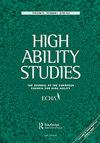不同智力水平儿童的流动智力、特质情商与学习成绩
IF 1.8
4区 教育学
Q2 EDUCATION, SPECIAL
引用次数: 7
摘要
摘要本研究考察了流体智力和特质情商(特质情商)对小学学龄资优儿童和普通儿童(8-11岁)学业成绩的影响。研究人员对104名普通儿童和80名天才儿童进行了雷文标准递进矩阵测试和儿童特征情商问卷调查。结果表明,资优儿童在数学、语文和英语方面的学习成绩优于一般儿童。流体智力和特质情商在预测天才儿童和普通儿童的学习成绩方面发挥着不同的作用,尤其是在数学和语文方面。具体来说,天才儿童的学习成绩只与流体智力有关,而普通儿童的学习成绩与流体智力和特质情商都有关;在控制流体智力后,特质情商在预测儿童平均学业成绩方面具有递增效度。本研究增强了我们对认知能力和情感能力在智力超常儿童和普通儿童的学习成绩中如何相互作用的理解。本文章由计算机程序翻译,如有差异,请以英文原文为准。
Fluid intelligence, trait emotional intelligence and academic performance in children with different intellectual levels
ABSTRACT This study examined the effects of fluid intelligence and trait emotional intelligence (trait EI) on academic performance in primary school-aged intellectually gifted and average children (8–11 years of age). One hundred and four average children and eighty gifted children were administered a Raven’s Standard Progressive Matrices and a Trait Emotional Intelligence Questionnaire-Child Form. The results demonstrated that intellectually gifted children showed better academic performance than did average children in math, Chinese and English. Fluid intelligence and trait EI played different roles in predicting gifted and average children’s academic performance, particularly in math and Chinese. Specifically, gifted children’s academic performance was associated only with fluid intelligence, whereas average children’s academic performance was related to both fluid intelligence and trait EI; trait EI had an incremental validity after controlling for fluid intelligence in predicting the average children’s academic performance. The present study enhances our understanding of how cognitive and emotional abilities interact in intellectually gifted and average children’s academic performance.
求助全文
通过发布文献求助,成功后即可免费获取论文全文。
去求助
来源期刊

High Ability Studies
Multiple-
CiteScore
4.80
自引率
11.10%
发文量
7
期刊介绍:
High Ability Studies provides a forum for scholars in a variety of disciplines associated with the development of human abilities to their highest level. It is a medium for the promotion of high ability, whether through the communication of scientific research, theory, or the exchange of practical experience and ideas. The contents of this journal are unique in reflecting concerns and recent developments in this area from childhood and across the whole life span in a variety of contexts. Far from being restricted to the traditional focus on high-level cognitive development, it also presents investigations into all other areas of human endeavour, including sport, technology, the arts, business, management and social relations.
 求助内容:
求助内容: 应助结果提醒方式:
应助结果提醒方式:


